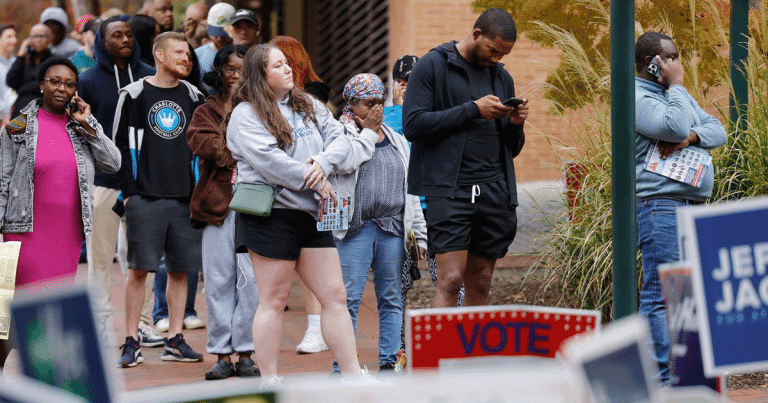
The dust has barely settled, and the media is buzzing with theories about how Donald Trump managed to humiliate Kamala Harris in a sweeping victory that’s left Democrats reeling. Across newsrooms, pundits are busy debating which voter groups swung the election in Trump’s favor.
Some say Black men turned out in higher-than-expected numbers. Others point to white women in the suburbs. And don’t forget the Latino vote—once seen as safely Democratic, it showed surprising shifts this year.
But one group turned out in droves for Trump, with exit polls showing he held an impressive lead among them. This was a shocking turnaround from 2020—and could signal a major sea-change for elections to come.
From Daily Caller:
Catholic voters turned out in droves for President-elect Donald Trump on Tuesday, playing a key role in propelling the Republican to the White House for a second term.Trump held an 18-point lead among Catholics as of Thursday morning, who made up roughly a quarter of the vote, according to early exit polling by The Washington Post. Democratic presidential nominee Kamala Harris struggled to gain traction with Catholics who largely disagreed with her broad abortion support and apparent anti-Catholic rhetoric.
Catholics Show Up for Trump
Catholic voters—making up about a quarter of the electorate—made it known they weren’t on board with Harris. The numbers tell the story: in 2020, Biden narrowly won this demographic by a margin of 52% to 47%. This time around, Catholics shifted decisively right, giving Trump a strong boost. Why? Part of it boils down to Harris’s unyielding stance on abortion.
Harris openly rejected exemptions for religious beliefs, alienating voters who value religious freedom. Many Catholics felt she showed a lack of respect for their faith, even coming across as anti-Catholic. Meanwhile, Trump’s running mate J.D. Vance, a Catholic himself, only helped reinforce the ticket’s appeal.
Then there was the Harris snub of the Al Smith charity dinner—a longstanding event supported by Catholics to aid children in need. Harris’s decision to skip it was noted, and not in a good way. The Al Smith dinner is a time-honored tradition for presidential candidates, and her absence was seen by many as an insult to Catholic voters.
For Catholics, this wasn’t just a campaign decision; it felt personal. By contrast, Trump’s presence, along with his Catholic running mate, painted a stark difference. As the Catholic Association’s Ashley McGuire put it, Harris’s approach was “anti-Catholic,” and voters took notice.
The Faith Factor: How Religious Issues Shifted Votes
The difference in approach to faith issues between Biden in 2020 and Harris in 2024 couldn’t have been more pronounced. Biden, for all his flaws, has long been a familiar face to Catholics.
He attended Mass regularly, spoke openly about his faith, and met with church leaders in ways that signaled respect. Harris, on the other hand, didn’t have that connection. Her campaign steered clear of faith discussions, leaving a void that Trump’s team eagerly filled.
Another significant factor was Harris’s stance on Israel during the ongoing Gaza conflict. Her perceived lack of defense for Israel was a red flag for many religious voters who view support for Israel as a fundamental part of religious liberty and American values.
Ralph Reed, founder of the Faith & Freedom Coalition, highlighted that this issue resonated powerfully among both Catholic and Protestant voters. It wasn’t just about policy; it was a question of principles and values. For religious voters, Harris didn’t come across as someone who understood or respected those values.
Religious Liberty and the Democrats’ Faith Problem
The Democratic Party’s ongoing faith problem became glaringly evident with Harris at the helm. Under Biden, Democrats had some footing with religious voters. But Harris’s progressive stance on social issues seemed to alienate even moderate Democrats within faith communities.
This trend was evident not only in the Catholic vote but also among Protestant and Evangelical Christians, who, according to exit polls, supported Trump by a hefty margin of 63% to 36%.
Under Biden, Democrats already faced criticism for infringing on religious freedom. The Biden administration’s policies, from pushing for taxpayer-funded abortions to supporting mandatory transgender surgeries for religious hospitals, didn’t sit well with many faith-based voters.
Even the FBI’s infamous memo describing traditionalist Catholics as “potential domestic terrorists” left a sour legacy that Democrats couldn’t shake. For Catholics and other Christian voters, the Democrats’ stance felt intrusive, authoritarian, and out of step with religious freedoms.
An Electoral Mandate from Catholics
As election night ended, it became clear: the Catholic vote had become a decisive factor. President Trump’s double-digit margin with this group might just be the highest seen for a Republican in decades.
Brian Burch of CatholicVote noted that Catholics proved themselves a critical voting bloc that both parties ignore at their peril. For many in this community, Trump’s platform aligned with core issues like religious liberty, traditional family values, and national security.
Looking ahead, the Democrats will have to rethink their approach to faith-based voters if they hope to be competitive in future elections. Harris’s campaign struggled not just because of policy but because of tone and attitude.
Religious voters didn’t see themselves represented, and they showed up in droves for Trump as a result. The question now is, can the Democrats bridge the gap with this pivotal bloc? For now, Trump’s victory sends a clear message: faith still matters to American voters, and ignoring it comes with a price.
Key Takeaways
- Catholic voters shifted right, giving Trump an 18-point lead over Harris.
- Harris’s stance on religious liberty and her anti-Catholic tone hurt her campaign.
- Faith-based voters, including Evangelicals, played a decisive role in Trump’s win.
Source: Daily Caller